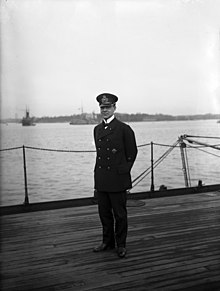Hugo Meurer
Hugo Meurer | |
|---|---|
 Hugo Meurer on April 19, 1918 on board SMS Prinzregent Luitpold in Helsinki | |
| Born | 28 May 1869 Sallach, Carinthia, Austria-Hungary |
| Died | 4 January 1960 (aged 90) Kiel, Germany |
| Allegiance | |
| Service | |
| Years of service | 1886–1920 |
| Rank | Vice Admiral |
| Commands | 4th Battle Squadron Baltic Sea Division |
| Battles / wars | First World War Finnish Civil War |
| Awards | Iron Cross 1914 (2nd and 1st class)[1] Bavarian Military Merit Order III Class With Crown and Swords Saxon Albrecht Order II Class Commanders Cross Prussian Lifesaving Medal Crowned Order of the Red Eagle (3rd class)[2] Prussian Long Service Cross (25 Years)[3][4] Oldenburg Friedrich August Cross[5] Mecklenburg-Schwerin Military Merit Cross (1914, 2nd class)[6] German China Campaign Medal[7] Wilhelm I Centenary Medal[8] Order of the Cross of Liberty (1st clss, Finland)[9] Qing Dynasty Order of the Double Dragon III Class, I Grade[10] Commander of the Order of Saints Maurice and Lazarus[11] |
Hugo Meurer (28 May 1869 – 4 January 1960) was a vice-admiral of the Kaiserliche Marine (German Imperial Navy). Meurer was the German naval officer who handled the negotiations of the internment of the German fleet in November 1918 at the end of the First World War.
Life
[edit]Meurer was born in Sallach in Carinthia. On 16 April 1886 he joined the Kaiserliche Marine.
During the First World War he served as commander of SMS Deutschland at the Battle of Jutland, and from 1916 to 1917 as captain of the battleship SMS König. In 1917 he was promoted to the rank of rear-admiral (Konteradmiral), as the second Admiral of the 4th Battle Squadron of the High Seas Fleet, which he remained until the end of the war.[12]
From 21 February to 2 May 1918, as commander of the special unit (Sonderverband) of the Baltic Sea, he led the naval expedition for the German intervention in the ongoing civil war in Finland.[13] In November 1918 Meurer negotiated as representative of Admiral Franz von Hipper with Admiral David Beatty the details of the surrender of the German fleet.[14]
Meurer was also the naval station commander of the Baltic, based in Kiel. He was dismissed on 8 January 1920, after derogatory remarks against the government, but still received the character (an unpaid honorary title) of vice-admiral.[15]
He died in 1960 in Kiel, where he was buried at the Nordfriedhof in Kiel [de].

Notes
[edit]- ^ Image of Meurer's Ribbon bar c. 1918: Weitze[permanent dead link]
- ^ Imperial Naval Office (ed.): Marine Ordnungsblatt. No. 14 of June 15, 1918, p. 175.
- ^ Imperial Naval Office (ed.): Marine Ordnungsblatt. No. 27 of 15 December 1917, p. 357.]
- ^ Marine Cabinet (ed.): Ranking of the Imperial German Navy for the year 1918. ES Mittler & Sohn, Berlin 1918, p. 7.
- ^ Image of Meurer's Ribbon bar c. 1918: Weitze[permanent dead link]
- ^ Image of Meurer's Ribbon bar c. 1918: Weitze[permanent dead link]
- ^ Image of Meurer's Ribbon bar c. 1918: Weitze[permanent dead link]
- ^ Image of Meurer's Ribbon bar c. 1918: Weitze[permanent dead link]
- ^ "Digitalisierte Sammlungen der Staatsbibliothek zu Berlin".
- ^ Marine Cabinet (ed.): Ranking of the Imperial German Navy for the year 1914. ES Mittler & Sohn, Berlin 1914, p. 176.
- ^ Marine Cabinet (ed.): Ranking of the Imperial German Navy for the year 1914. ES Mittler & Sohn, Berlin 1914, p. 176.
- ^ World War I Document Archive
- ^ see de:Finnland-Intervention[circular reference]
- ^ www.underwater-archaeology.org.uk: Scapa Flow Archived 2010-07-11 at the Wayback Machine; "Semaphore"
- ^ Gerhard Granier: Magnus von Levetzow: Seeoffizier, Monarchist und Wegbereiter Hitlers – Lebensweg und ausgewählte Dokumente. Boppard am Rhein 1982 (Schriften des Bundesarchivs Nr. 31), p. 64.
External links
[edit]- World War I Document Archive: Commanders of the High Seas Fleet Battle Squadrons 1914-1918
- Australian Navy: Semaphore, issue 14, Nov 2008 - "1918, Victory at sea"
- Short biography, with photo of Meurer's gravestone (in German)
- 1869 births
- 1960 deaths
- People from Styria
- Vice admirals of the Imperial German Navy
- Vice admirals of the Reichsmarine
- Recipients of the Iron Cross (1914), 1st class
- People of the Finnish Civil War (White side)
- Commanders of the Order of Saints Maurice and Lazarus
- German anti-communists
- German expatriates in Finland
- Emigrants from Austria-Hungary to Germany
- German Navy personnel stubs
